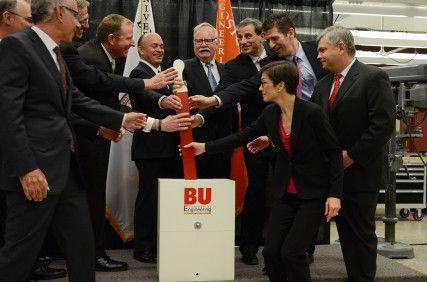
Boston University’s College of Engineering officials held a ribbon-cutting ceremony Thursday to signify the opening of their newest facility, the Engineering Product Innovation Center.
Situated at 750 Commonwealth Ave., EPIC will allow students more hands-on experience in the engineering field that they previously had limited access to, said ENG Dean Kenneth Lutchen.
“EPIC has a vision nothing short of transforming engineering education nationally,” Lutchen said. “So every engineer, regardless of their area of interest, learns the process of going from design to computer-aided design to prototype to mass producing, something that could be a product to impact society and have economic value.”
The opening of the EPIC building corresponds with the recent adjustments to the ENG curriculum, which has been restructured to take advantage of the new technology and resources that EPIC will provide to students, said BU President Robert Brown.
“The curriculum change [EPIC] supports is really innovative in the whole context of the ENG because it actually puts product design and manufacturing engineering into the curriculum in all the engineering disciplines, which is not traditional,” Brown said.
ENG professor Andre Sharon, director of the Fraunhofer Center for Manufacturing Innovation, said EPIC is an innovative step toward enhancing the education of engineering students.
“It’s really going to be the centerpiece of educating a new generation of engineering students that are going to be well-versed in the entire process from concept all the way to physical realization, actually building things,” Sharon said. “So not just learning the theory and the equations but actually learning how to produce something and create jobs in the process.”
The facilities of EPIC include cutting-edge technology such as 3-D printers, project management software, robotics and other online software that will give students the opportunity to put theory into actuality, Sharon said.
Sharon said one of the most exciting new technologies is the 3-D printer that simplifies the process of designing a product and actually creating it.
“One of the hottest technologies in manufacturing these days is called additive manufacturing, or … 3D printing,” he said. “They [EPIC facilities] have a number of 3-D printers where you can actually produce parts without any special fixture, straight from the CAD [computer-aided design] models.”
ENG Associate Dean Sol Eisenberg said the subtractive manufacturing and injection molding capability in EPIC’s facilities provide ENG students with technology normally off-limits to students.
“Subtractive manufacturing … and injection molding capability, which is what most plastic parts are made of, those are some of the most important manufacturing technologies that most students don’t get a chance to play with,” Eisenberg said.
Jim Langell, the director of the mechanical engineering department, said EPIC will provide ENG students with professional experience earlier in their careers by giving younger students the opportunity to participate in creative engineering.
“We found that when we do their senior projects, for example, a lot of times that’s been the first time they have done any really creative engineering, so this facility is going to make that a lot easier,” Langell said. “It’s also going to be introduced earlier in the curriculum, so they’ll be doing real engineering a lot earlier in their career.”
Langell said EPIC will not only place ENG at the forefront of engineering education, but will also bolster BU’s reputation as a technologically advanced university.
“[EPIC] is one of those things that is rather unique to engineering schools,” Langell said. “Most schools don’t have something like this and so it is going to be a plus to help [BU] stand out.”
Editor’s note: A previous version of this story said Langell was director of the chemical engineering department, but he is actually director of the mechanical engineering department. The story has been updated to reflect this.























































































































